 Petzlover
Petzlover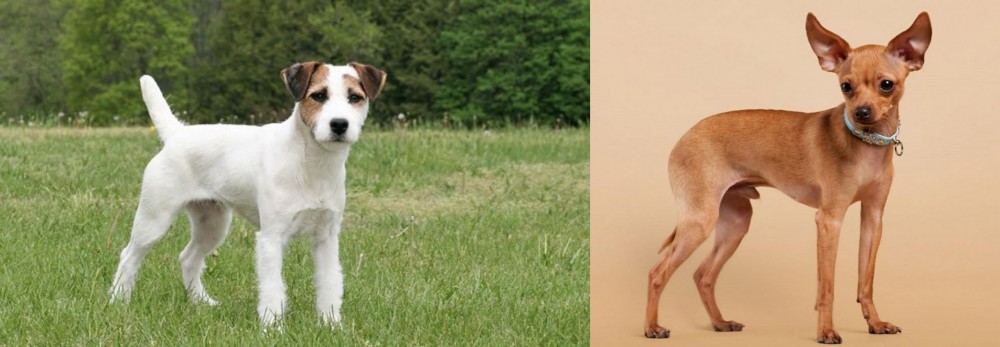 Jack Russell Terrier is originated from United Kingdom but Russian Toy Terrier is originated from Russia. Jack Russell Terrier may grow 10 cm / 4 inches higher than Russian Toy Terrier. Both Jack Russell Terrier and Russian Toy Terrier are having almost same weight. Jack Russell Terrier may live 3 years more than Russian Toy Terrier. Both Jack Russell Terrier and Russian Toy Terrier has almost same litter size. Both Jack Russell Terrier and Russian Toy Terrier requires Low Maintenance.
Jack Russell Terrier is originated from United Kingdom but Russian Toy Terrier is originated from Russia. Jack Russell Terrier may grow 10 cm / 4 inches higher than Russian Toy Terrier. Both Jack Russell Terrier and Russian Toy Terrier are having almost same weight. Jack Russell Terrier may live 3 years more than Russian Toy Terrier. Both Jack Russell Terrier and Russian Toy Terrier has almost same litter size. Both Jack Russell Terrier and Russian Toy Terrier requires Low Maintenance.
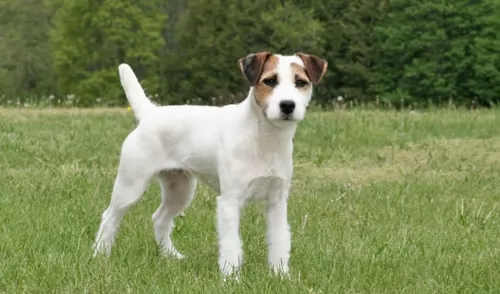 The popular Jack Russell Terrier was developed in Devonshire in the south of England in the late 1800's so as to hunt foxes.
The popular Jack Russell Terrier was developed in Devonshire in the south of England in the late 1800's so as to hunt foxes.
Often believed to be the Parson Russell Terrier, the Jack Russell Terrier was developed by Parson John Russell. This is where the dog gets his breed name from. Some people get the Jack Russell Terrier a little bit mixed up with the Parson Russell terrier, when it fact its actually a different breed, but sharing a common ancestry.
The Jack Russell Terrier is smaller than the Parson and bigger than the Russell Terrier. The breed became known in the U.S. by the 1930s and the Jack Russell Terrier Association of America wanted recognition by the American Kennel Club, which was granted in 2000.
 The Russian Toy Terrier is one of the dog breeds that hails from Russia in the 20th century. The Russian nobility fancied these little dogs as companions but also as they were useful for catching rats and being watchdog.They would set off an alarm with their barking.
The Russian Toy Terrier is one of the dog breeds that hails from Russia in the 20th century. The Russian nobility fancied these little dogs as companions but also as they were useful for catching rats and being watchdog.They would set off an alarm with their barking.
It is believed that the Manchester Terrier and the English Toy Terrier were the foundation breeds for this dog.
They are available in smooth and long-haired varieties. The breed has recently been recognized by the UK Kennel Club but is not yet recognized by the American Kennel Club.
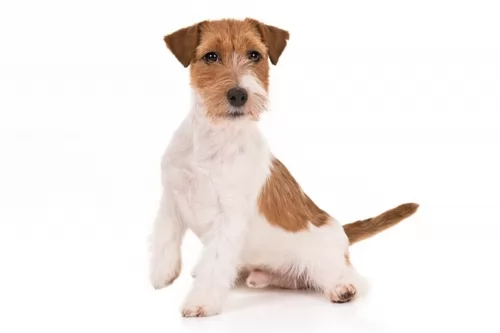 The Jack Russell Terrier is a small dog that weighs between 6 and 8kg and stands at between 25 – 38cm. The body length of the dog should be in proportion to the height.
The Jack Russell Terrier is a small dog that weighs between 6 and 8kg and stands at between 25 – 38cm. The body length of the dog should be in proportion to the height.
He is essentially a white dog with orange or fawn colored patches. The coat is mostly smooth and short, but the coat can also be longer and rough or it can be broken which is a combination of rough and smooth. Regardless of coat type, they are dense, double coats which will require brushing at least twice a week to remove loose hairs. He may also be tri-colored such as being white with black and tan patches.
He has alert, bright dark brown eyes and ears which are somewhat erect and which flop over at the tips. The tail has always been traditionally docked, giving him an attractive, compact look about him but unfortunately the tail is often left long on the dog these days.
Your Jack Russell Terrier is a lively, tenacious, bold, fearless, feisty, cheeky, confident, independent, intelligent and full of life dog. He is super energetic and exuberant, spirited and full of personality.
There are some dog owners who are exhausted by him and would prefer a more quieter dog breed as their companion. Nonetheless he has some excellent characteristics such as being a totally devoted and loving dog.
It is why it is a good idea to have him trained and socialized as it calms him down and makes him more obedient. He is very intelligent and training him will be easy.
 The Russian Toy Terrier is a petite dog and is inclined to be a fragile dog breed. It belongs to the toy group. It is also known as the Russian Toy Terrier or the Russkiy Toy.
The Russian Toy Terrier is a petite dog and is inclined to be a fragile dog breed. It belongs to the toy group. It is also known as the Russian Toy Terrier or the Russkiy Toy.
The dog’s small size means it is ideal for living in the city or the countryside.
He measures between just 20 and 28cm and weighs between just 1kg and 3kg.
The dog has a small head with big eyes and ears which are large ad erect. The tail was always traditionally docked to give it a cute, compact look, but these days it is left long.
You also get a long-coated dog and the smooth coated dog. The long coated variety has a lot of feathering around the tail, legs and ears. Colors of the coat can be solid red, brown and tan, black and tan or greyish and tan.
This little dog is full of character and is bold and cheerful. He is such a loyal, devoted little dog and small though he is he is territorial, protecting and guarding his owner. It is such a sociable little dog, devoted to his human family, while being wary of strangers.
Even a small dog like this will need training and socialization as he can become yappy and clingy if he is constantly piked up and petted.
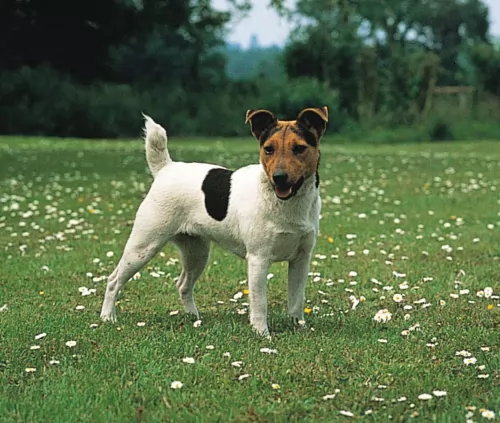 With loads of vibrant personality, the energetic Jack Russell Terrier has got so many wonderful characteristics to his name – devotion, intelligence, charming, lively, playful and he is an entertainer – you’ll always be laughing a him.
With loads of vibrant personality, the energetic Jack Russell Terrier has got so many wonderful characteristics to his name – devotion, intelligence, charming, lively, playful and he is an entertainer – you’ll always be laughing a him.
You do need to pay him attention – you can’t just plonk him in your backyard and forget about him. He wants your love and attention and ignoring him can lead to problem behavior such as obsessive barking.
Give your Jack Russell Terrier all the love and care he needs, and you’ll have an exceptional pet and friend.
 The Russian Toy is a small, feisty dog with long legs and huge upright ears. He is intelligent too. Don't let his fine structure deceive you as he is far more robust and tough than he looks.
The Russian Toy is a small, feisty dog with long legs and huge upright ears. He is intelligent too. Don't let his fine structure deceive you as he is far more robust and tough than he looks.
He is a great playmate for disciplined, respectful children who know how to be kind to animals. Wild, unruly kids could so easily accidentally break one of his tiny little legs during rough play.
He loves his human family though and is guaranteed to make you an excellent little pet and companion.
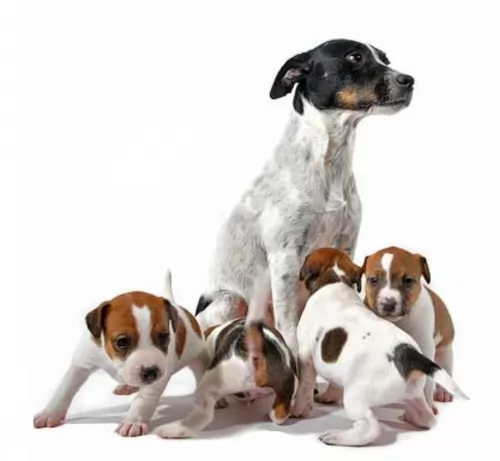 This particular dog breed has a reputation for being healthy and living to a good age such as 16 or 17 years of age. Of course he needs to be given proper care to reach such a good age.
This particular dog breed has a reputation for being healthy and living to a good age such as 16 or 17 years of age. Of course he needs to be given proper care to reach such a good age.
Some common dog disorders you might want to be aware of are -
Lens luxation is actually a common hereditary disorder in these dogs, but even so, with good care, your dog isn’t likely to battle with it. What happens is that the lens in the eye becomes displaced. There are two types, with Posterior luxation being the lesser severe one.Treatment is available.
Patellar luxation is an hereditary disorder affecting the knees of the dog. The kneecap slips off the groove where it sits and you may notice your dog running while holding his hind leg in the air. It can sometimes slip back in place and then you see your dog running in his usual way. It becomes more serious when it affects both legs.
 There isn’t too much information about inherited health problems with this dog and he can live to be 11, 12 or 13 years of age, maybe even longer.There are one or two health problems to be aware of -
There isn’t too much information about inherited health problems with this dog and he can live to be 11, 12 or 13 years of age, maybe even longer.There are one or two health problems to be aware of -
This condition occurs with the knee caps of the dog and either one or both back legs can be affected. Sometimes surgery will be required to help the dog.
Little dogs always battle with their teeth, and the Russian Toy Terrier can experience problems when the puppy or ‘milk’ teeth don’t fall out. It affects the development of adult teeth. Sometimes the vet even has to have the teeth removed.
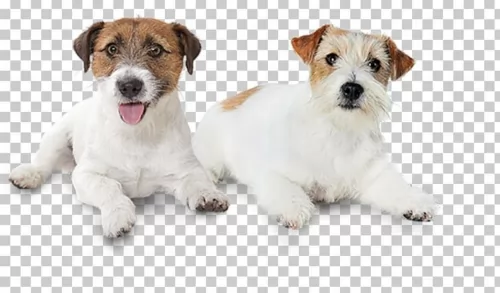 The Jack Russell Terrier isn’t just a small dog that can be left to his own devices. He will need proper training and socialization early in life to make him obedient and better to get on with.
The Jack Russell Terrier isn’t just a small dog that can be left to his own devices. He will need proper training and socialization early in life to make him obedient and better to get on with.
He may be a small dog, but he certainly won’t do in the city where he is cooped up in a place with a handkerchief of a garden. He needs lots of space to run and play. He wants his human family to join in with walks, hikes, ball games and swimming.
You can buy excellent commercially manufactured dog food which caters for energetic small dog breeds like the Jack Russell Terrier.
Once you have selected the best one for your pet, with dry kibble being better in terms of dental health - you can also add in some brown rice, vegetables and cooked chicken. This is highly beneficial to all dog breeds. A little bit of raw meat can sometimes be added in too.
The bottom line is to to prevent your pet from eating foods high in preservatives, additives and fillers. Never leave your pet without a constant supply of fresh, cool water.
 The Russian Toy Terrier is a small breed and isn’t going to need too much exercise. However it will do him good to get out to sniff around, and a walk every day will be recommended.
The Russian Toy Terrier is a small breed and isn’t going to need too much exercise. However it will do him good to get out to sniff around, and a walk every day will be recommended.
Your Russian Toy Terrier is a fairly low maintenance dog and isn’t going to require specialist grooming. The little dog will simply require some occasional brushing to remove loose hair.
When you brush him, check inside his mouth for bad teeth as small dogs like this can suffer from pain with overcrowding of teeth.
Tiny though he is, the Russian Toy Terrier will need good food. It will be tempting to pop sugary treats into such a tiny little dog’s mouth. This can in fact be seriously dangerous for him, not to mention that he can become obese. This opens up anew set of health problems.
You can feed this little dog commercially manufactured food but it should be the best quality one for small breeds.
Give him some tasty homemade food too. Simply add into one big pot chicken, brown rice or pasta and spinach, sweet potatoes and carrots. This food can all be chopped up, refrigerated and added warmed up and in small portions to your tiny pets dry kibble once or twice a week.
A tiny bit of raw meat can also go a long way to ensuring his skin stays healthy and free of skin infections.
Ensure that there is always a bowl of fresh, cool water within his reach.